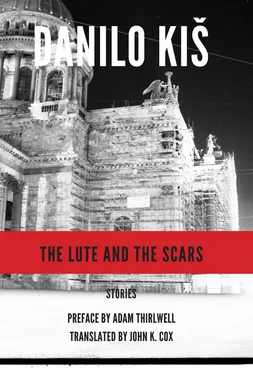In the text that the rabbi read aloud, I recognized a brief passage that had been printed twenty years ago on the cover of Jurij Golec’s one novel: “Born in Ukraine in the years immediately following the civil war, Jurij Golec, once a prisoner at Auschwitz, has lived in Paris since 1946. After pursuing Asian studies in Poland, Germany, and at the Sorbonne, he worked as a correspondent for various foreign newspapers. His one novel — he was, as one says, a man of one book — was written in French.” Then the rabbi listed all the volumes of poetry and essays, and he particularly emphasized the major role that Jurij Golec played in the awarding of the Nobel Prize to Elias Canetti. “He helped his neighbors; he prayed facing toward Jerusalem; in his own way, he believed in God.”
When the rabbi began reading the Psalms, alternating between Hebrew and French, five or six men put on the yarmulkes they pulled from their pockets. Dr. Wildgans placed a twice-folded handkerchief on his head.
The rabbi read, holding his Bible on the casket as if it were a pulpit, supporting himself with his fists on the lid: “My soul drew near even unto death, my life was near to the hell beneath. They compassed me on every side, and there was no man to help me: I looked for the succor of men, but there was none.”
And he continued in Hebrew: “Adonai, Adonai.”
“O Lord, rebuke me not in thy wrath: neither chasten me in thy hot displeasure. For thine arrows stick fast in me, and thy hand presseth me sore. I am feeble and sore broken: I have roared by reason of the disquietness of my heart. Lord, all my desire is before thee; and my groaning is not hid from thee. My lovers and my friends stand aloof from my sore; and my kinsmen stand afar off. Forsake me not, O Lord: O my God, be not far from me. Make haste to help me, O Lord my salvation.”
This was a distant echo of King David’s voice, pressing toward us from the obscurity of time and history; it was the testimony of an inspired and afflicted poet, written some three thousand years ago, that still reaches our hearts like a knife and like balsam.
“I cry out to you, Lord, saying, ‘You are my confidence, my portion in the realm of the living. Hear my lament, for I am much tormented; save me from those who persecute me, for they are mightier than I. Lead my soul from the dungeon, that I might praise your name. The righteous will gather around me, if you are favorably disposed to me.’”
Next to the grave, on the edge of the marble slab, I caught sight of a dead rat; it lay on its stomach, as if resting for a moment; its tail, stiff and straight, lay draped on the ground like a standard in defeat. What led it here? What worked its death? I wondered. Was God’s providence perhaps at work here? Jurij Golec, a connoisseur of the Talmud and the Upanishads, would certainly have found an explanation for this phenomenon, and would not have seen any provocation in it. Then I remembered: “A few late rats, like bulky army tanks, are making their way home to their boathouses.” So it’s a rat from that simile of his, I thought; one that has come straight from his novel to the Montparnasse cemetery. Because nothing is stable apart from the grand illusion of creation; no energy is ever lost there; every written word is like Genesis.
I stood by the grave and observed. Hugging the stone and seemingly contorted, ants stretched out their wispy antennae in the direction of the huge swollen body, not daring to attack it. And the dead rat, the living rat from the novel, lay there motionless, still unmarked by any visible signs of decay, like a heavy armored vehicle; its treads had been blown apart by an anti-tank mine and its crew had abandoned it.
“I sink into the deep mire, where there is no bottom; I fall beneath the water into the depths and the spate will cover me. May my prayer rise up before you; incline your ear to my wailing; for my soul is full of woe, and my life approaches the inferno. You have placed me in the bottom of the deepest pit, into the darkness and the abyss.”
Using ropes, the gravediggers lowered the casket into the hole that had been dug next to the drive. The letters on Noémie’s headstone were already starting to dull; the marble plaque resembled an iceberg that had survived the winter; on the bare wires of the wreaths scraps of crepe paper hung, washed colorless by the rain.
As we moved past the opening, we threw handfuls of earth onto the coffin, the same way one used to throw stones onto dead bodies in the desert so their skeletons wouldn’t be scattered by wild animals. One of the gravediggers was carrying a little wooden chest with earth from Jerusalem; the earth was light in color and loose and was mixed with desert sand. The wreaths were all leaning on Noémie’s grave. One of them read “For Jurij Golec — may God forgive you.” I understood, even though the name of the benefactor wasn’t listed: “I only like living people; I don’t like dead people.” I knew who was capable of leaving so harsh a message, which was also a sign of love.
I waited around until the undertakers had put the marble slab in place. It was identical to the one on Noémie’s grave. Then I helped them arrange the wreaths, and divide them fairly. After so many years the two of them were resting under the same roof again, like a pair of lovers from the old days; not in the same grave, but still next to each other. After thirty-three years of shared life.
“An excellent bottom line for an old Jewish couple,” I said to myself.
Postscript
The name Jurij Golec is not invented; it’s merely one of the names that my unfortunate friend Piotr Rawicz assigned the narrator in his one novel, Blood from the Sky. Thus his presence in this story has remained halfway between reality and the world of Platonic concepts.
The price of the fur coat seemed exaggerated to me at first, and I was prepared to lower it arbitrarily by knocking off a zero. Fortunately, just as I was finishing this story, I found an ad in a newspaper (from November 19, 1982) for a large store specializing in furs; a Russian sable at that time cost 106,000 francs after the 15 % discount (original price: 125,000). Thus I learned, six months after taking a look into the closet of the woman known here as Noémie, that her most expensive fur coat was a zibeline (Russian sable), that it was worth precisely the amount given in the story, and that J.G. had not exaggerated. Aside from these utilitarian facts, e.g., the price of a fur, I discovered an entire array of exotic fauna and subsequently went over Noémie’s wardrobe in my mind, that wardrobe where so many furs of inscrutable origins shimmered: mink, silver fox, arctic fox, lynx, Canadian wolf, astrakhan, beaver, nutria, marmot, muskrat, coyote; and these have now, voilà , found their way into the story through the back door, after the fact, unleashing new sensations, opening new worlds: métiers , market forces, money, adventure, hunting, weapons, knives, traps, blood, animal anatomy, zoology, far-off exotic regions, nocturnal animal noises, Lafontaine’s fables; great are the temptations of a tale. In contrast to a novel, however, one may not, in a tale, open the doors of cabinets with impunity.
Although I had sworn never to set foot in the place again, one evening, after a two-year absence from Belgrade, I dropped by the Writers’ Club. I’d had plenty of opportunities to convince myself that associating with authors was difficult, fraught with misunderstandings, jealousy, and insults. And I was also aware of the fact that this kind of intellectual struggle, éscrime littéraire , bitter and sterile, is part and parcel of the literary trade, just like writing reviews and checking page proofs. On this point I remembered a piece of advice that Chekhov once gave a young writer, challenging him to leave the provinces and mingle with the literary crowd in the big city; once he’d gotten to know them, he would draw less idealistic conclusions about writers.
Читать дальше












